人教版(2019)选择性必修 第二册Unit 2 Bridging Cultures Reading and Thinking课件(共49张PPT)
文档属性
| 名称 | 人教版(2019)选择性必修 第二册Unit 2 Bridging Cultures Reading and Thinking课件(共49张PPT) |
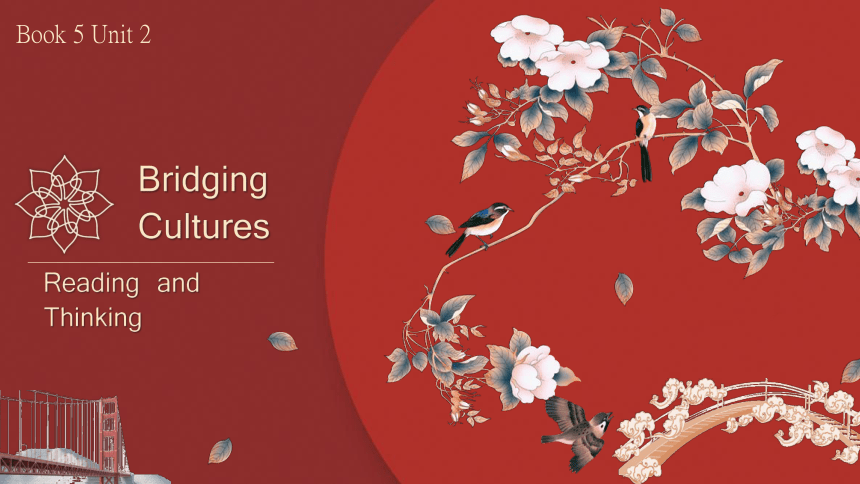
|
|
| 格式 | pptx | ||
| 文件大小 | 17.6MB | ||
| 资源类型 | 教案 | ||
| 版本资源 | 人教版(2019) | ||
| 科目 | 英语 | ||
| 更新时间 | 2023-12-03 00:00:00 | ||
图片预览

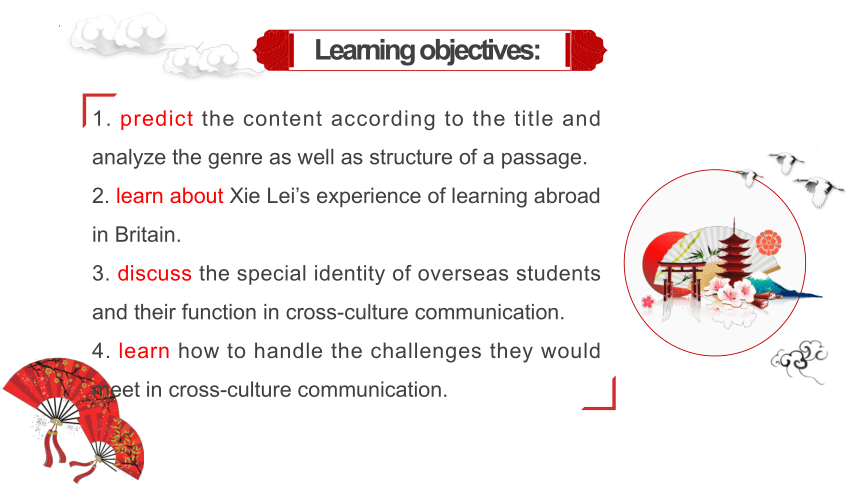

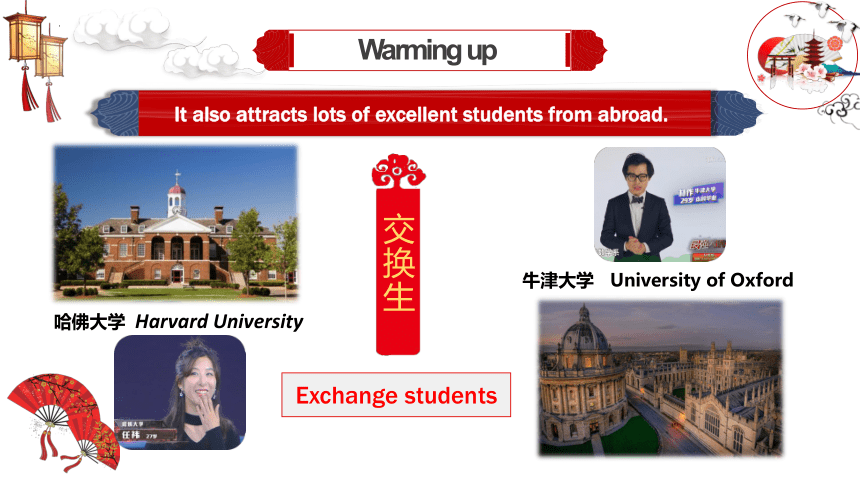
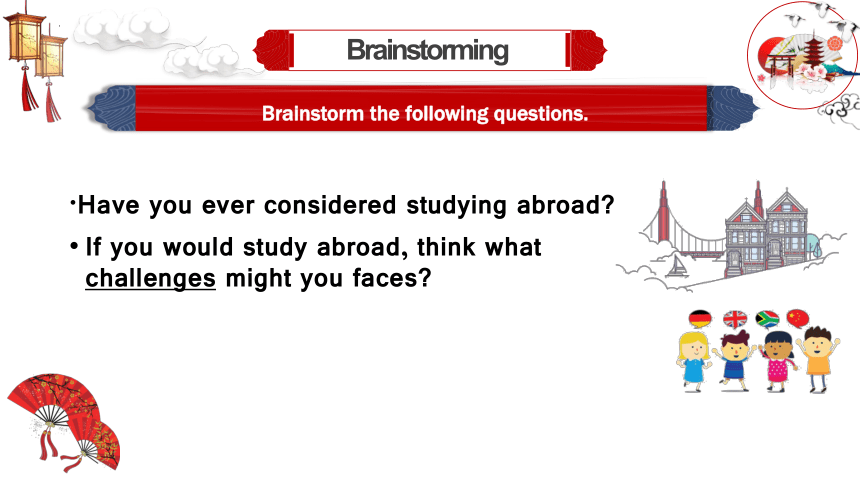
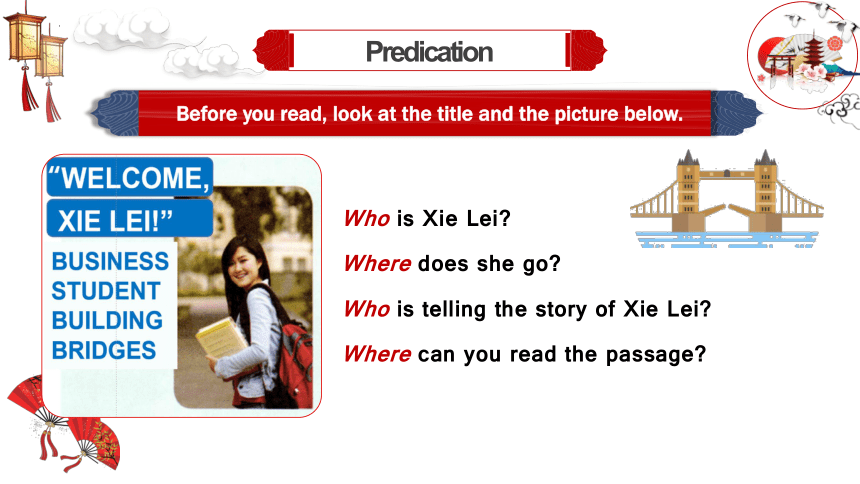
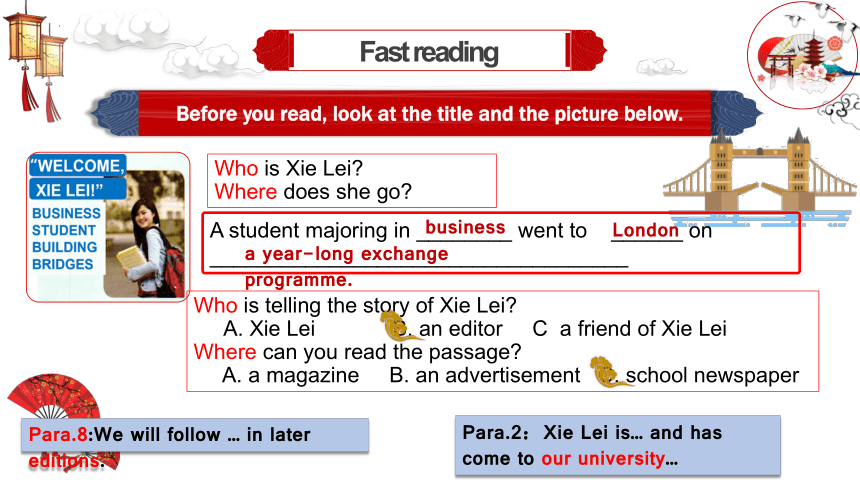
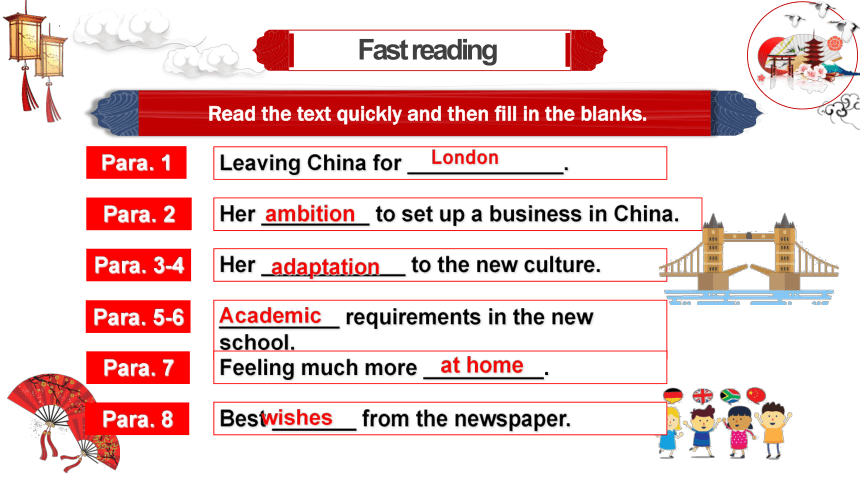
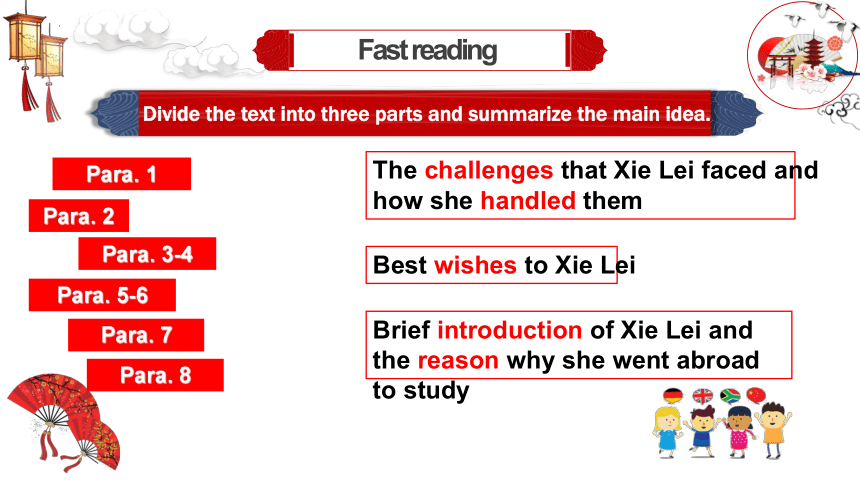
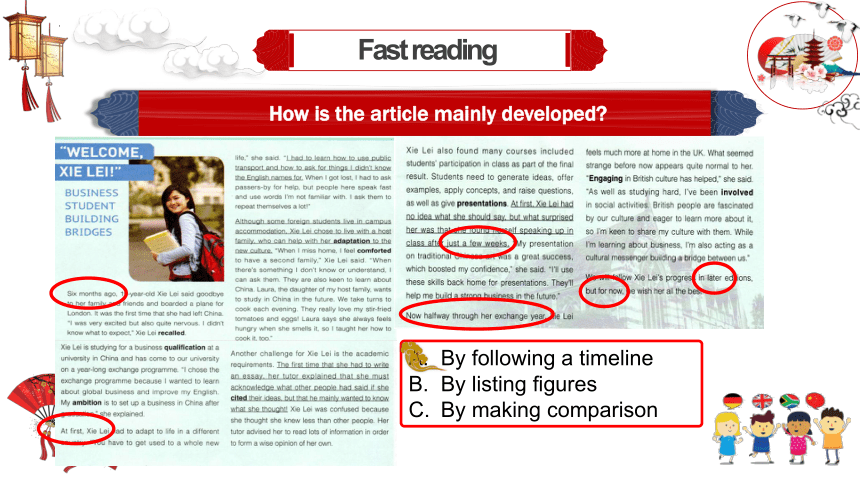
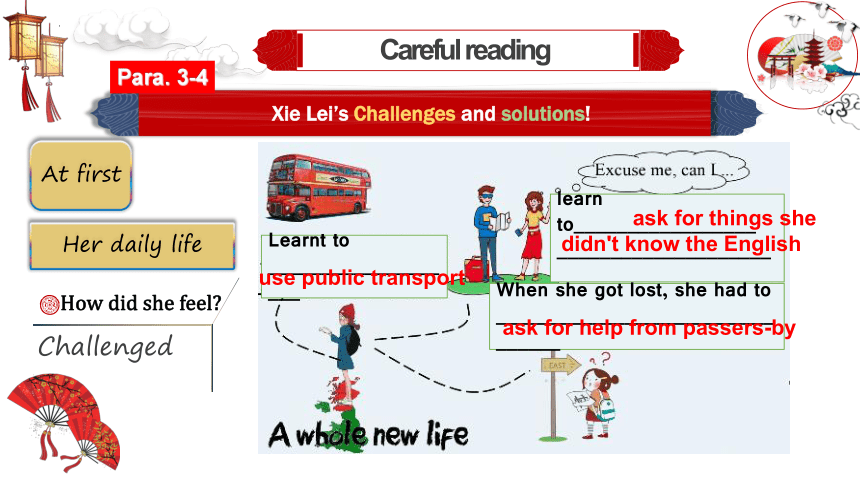
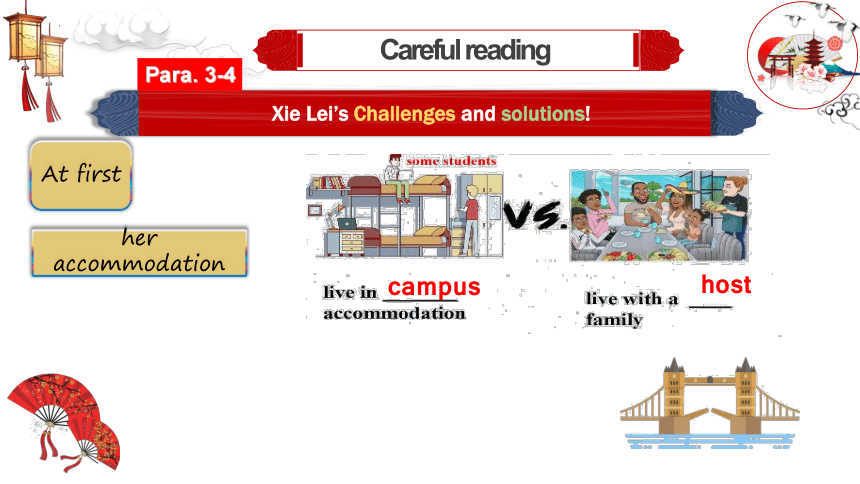
文档简介
(共49张PPT)
Book 5 Unit 2
Reading and Thinking
Bridging Cultures
Learning objectives:
1. predict the content according to the title and analyze the genre as well as structure of a passage.
2. learn about Xie Lei’s experience of learning abroad in Britain.
3. discuss the special identity of overseas students and their function in cross-culture communication.
4. learn how to handle the challenges they would meet in cross-culture communication.
Warming up
Have you ever watched a TV programme named “Super Brain” Lots of Straight A students from the top university in China compete with each other.
Warming up
It also attracts lots of excellent students from abroad.
哈佛大学 Harvard University
牛津大学 University of Oxford
Exchange students
交换生
Brainstorming
Brainstorm the following questions.
Have you ever considered studying abroad
If you would study abroad, think what challenges might you faces
Predication
Before you read, look at the title and the picture below.
Who is Xie Lei
Where does she go
Who is telling the story of Xie Lei
Where can you read the passage
Fast reading
Before you read, look at the title and the picture below.
Who is Xie Lei
Where does she go
A student majoring in ________ went to ______ on ___________________________________
business
London
a year-long exchange programme.
Who is telling the story of Xie Lei
A. Xie Lei B. an editor C a friend of Xie Lei
Where can you read the passage
A. a magazine B. an advertisement C. school newspaper
Para.8:We will follow … in later editions.
Para.2:Xie Lei is… and has come to our university…
Fast reading
Read the text quickly and then fill in the blanks.
Para. 1
Para. 2
Para. 5-6
Para. 7
__________ requirements in the new school.
Her _________ to set up a business in China.
Leaving China for _____________.
Feeling much more __________.
Her ____________ to the new culture.
Para. 3-4
Best _______ from the newspaper.
Para. 8
London
ambition
adaptation
wishes
at home
Academic
Fast reading
Divide the text into three parts and summarize the main idea.
Brief introduction of Xie Lei and the reason why she went abroad to study
The challenges that Xie Lei faced and
how she handled them
Best wishes to Xie Lei
Para. 1
Para. 2
Para. 5-6
Para. 7
Para. 3-4
Para. 8
Fast reading
How is the article mainly developed
By following a timeline
By listing figures
By making comparison
Xie Lei’s Challenges and solutions!
Her daily life
At first
Learnt to ___________________
learn to_________________
__________________________
When she got lost, she had to
________________________________
use public transport
ask for things she didn't know the English
ask for help from passers-by
Challenged
How did she feel
Careful reading
Para. 3-4
Xie Lei’s Challenges and solutions!
her accommodation
At first
campus
host
Careful reading
Para. 3-4
Xie Lei’s Challenges and solutions!
her accommodation
At first
campus
host
1. Which way did she choose Why
She chose to live with a host family, because It can help with her adaptation to the new culture.
2. What did she share with her host family about Chinese culture
She taught the daughter of her host family how to cook stir-fried tomatoes and eggs.
comforted
How did she feel
Careful reading
Para. 3-4
Xie Lei’s Challenges and solutions!
the academic requirements
At first
1. What did her tutor teach her when she wrote an essay
She must acknowledge what other people said if she cited their ideas. But her tutor wanted to know her ideas and advised her to read a lot to form her own opinion.
confused
How did she feel
Careful reading
Para. 5
Careful reading
Xie Lei’s Challenges and solutions!
the academic requirements
At first
1. What does many coursed include as part of the final result
Students’ participation
Para. 6
Xie Lei’s Challenges and solutions!
the academic requirements
At first
2. How to participate in class
Generate
Offer
Apply
Raise
Give
Careful reading
Para. 6
Xie Lei’s Challenges and solutions!
the academic requirements
Weeks later
3. What did she do in class
After just a few weeks, she found herself speaking up in class and she found her presentation on __________________________ was a great success.
traditional Chinese art
Confident
How did she feel
Careful reading
Para. 6
Careful reading
Xie Lei’s Challenges and solutions!
Cultural messenger
Now
4. How did she act as a cultural messenger
She has engaged in __________________ , studied hard and involved in______________.
British culture
social activities
Felt at home
How did she feel
Para. 7
Careful reading
Xie Lei’s feelings
Sentence pattern: “She felt…..because”
time
feelings
six months ago
at first
academic challenge
after a few weeks
halfway through
excited
&nervous
comforted
feel at home
confused
confident
went to London for the first time
lived with a host family
problems in studies
gave a successful presentation
engaged in Britain culture& social activities
P15, Activity3
Post reading
How to “bridge cultures”
learn
_________ culture
share
_________ culture
We should
foreign
Chinese
Post reading
How to “bridge cultures”
How has Xie Lei helped to build bridges between China and the UK
Acting as _____________________
Getting involved in________________
Sharing _________________________
Giving presentation on ____________________
Teaching people how to cook_______________
a cultural messenger
social activities
Chinese culture with them
traditional Chinese art
Chinese food
Role play-- Now work in pairs.
Suppose one of you is the reporter for your school newspaper and the other is Xie Lei.
The reporter needs to interview Xie Lei about her life in the UK. Xie Lei could give more information than what is written in the text if necessary.
Discussion
Discussion
(Write down key information while listening carefully)
Discussion
If you would study abroad, think what challenges might you faces How will you prepare to handle them in advance
challenges
studying abroad
daily life
Study essay
participation
religious conflicts
racial
discrimination
language barriers
......
1.Understand the differences and try to fit in.
2.Respect the culture differences.
3.Open your mind.
Assignment
Please write a follow-up edition on “Welcome Xie Lei”(必做)
Search for examples of culture shock, and share with the class next period. (必做)
Brainstorm more challenges and solutions when studying abroad.(选做, 可抵消2天的书写作业)
Analysis of sentences
I had to learn
how to use public transport and how to ask for things
I didn’t know the English names for.
我不得不学习如何使用公共交通和如何去询问那些我不知道怎么用英语表达的事物。
things
Analysis of sentences
I had to learn
how to use public transport and how to ask for things
I didn’t know the English names for.
我不得不学习如何使用公共交通和如何去询问那些我不知道怎么用英语表达的事物。
句子1
sth
things
Analysis of sentences
I had to learn
how to use public transport and how to ask for things
I didn’t know the English names for.
我不得不学习如何使用公共交通和如何去询问那些我不知道怎么用英语表达的事物。
句子1
sth
sth=
分析1:两个由and连接的how to do sth做learn的宾语。
Analysis of sentences
I had to learn
how to use public transport and how to ask for things
I didn’t know the English names for.
我不得不学习如何使用公共交通和如何去询问那些我不知道怎么用英语表达的事物。
句子1
sth
sth=
分析1:两个由and连接的how to do sth做learn的宾语。
things
句子2
分析2:省略了that的定语从句;things是先行词,在后面的定语从句中做for的宾语。
Analysis of sentences
Although some foreign students live in campus accommodation,
译文:虽然有些外国学生住在学校的宿舍里,但谢蕾选择了寄宿家庭,他们可以帮助她适应新的文化 。
Xie Lei chose to live with a host family
who can help with her adaptation to the new culture.
Analysis of sentences
Although some foreign students live in campus accommodation,
译文:虽然有些外国学生住在学校的宿舍里,但谢蕾选择了寄宿家庭,他们可以帮助她适应新的文化 。
Xie Lei chose to live with a host family
who can help with her adaptation to the new culture.
句子1
分析1:although引导的让步状语从句,后面则是主句。
Analysis of sentences
Although some foreign students live in campus accommodation,
译文:虽然有些外国学生住在学校的宿舍里,但谢蕾选择了寄宿家庭,他们可以帮助她适应新的文化 。
Xie Lei chose to live with a host family
who can help with her adaptation to the new culture.
句子1
分析1:although引导的让步状语从句,后面则是主句。
a host family
句子2
分析2:who引导的定语从句,先行词是a host family;在定语从句中做主语。
Analysis of sentences
The first time that she had to write an essay,
译文:她第一次写论文时,导师跟她解释说, 如果引用别人的观点就一定要注明,不过导师主要是想了解她本人的观点。
her tutor explained
that she must acknowledge
what other people had said
if she cited their ideas
but that he mainly wanted to know
what she thought.
Analysis of sentences
The first time that she had to write an essay,
译文:她第一次写论文时,导师跟她解释说, 如果引用别人的观点就一定要注明,不过导师主要是想了解她本人的观点。
her tutor explained
that she must acknowledge
what other people had said
if she cited their ideas
but that he mainly wanted to know
what she thought.
句子1
sth
分析1:the first time (that)是连词,引导时间状语从句,意思是“第一次…”; her tutor explained sth则是主句。
Analysis of sentences
The first time that she had to write an essay,
译文:她第一次写论文时,导师跟她解释说, 如果引用别人的观点就一定要注明,不过导师主要是想了解她本人的观点。
her tutor explained
that she must acknowledge
what other people had said
if she cited their ideas
but that he mainly wanted to know
what she thought.
句子1
sth
Sth 2
Sth 3
分析2:but连接的两个由that引导的宾语从句,都做explain的宾语。
Analysis of sentences
The first time that she had to write an essay,
译文:她第一次写论文时,导师跟她解释说, 如果引用别人的观点就一定要注明,不过导师主要是想了解她本人的观点。
her tutor explained
that she must acknowledge
what other people had said
if she cited their ideas
but that he mainly wanted to know
what she thought.
句子1
sth
Sth 2
Sth 3
Sth 2
句子2
分析3:what引导的宾语从句,做acknowledge的宾语;if引导的是条件状语从句。
Analysis of sentences
The first time that she had to write an essay,
译文:她第一次写论文时,导师跟她解释说, 如果引用别人的观点就一定要注明,不过导师主要是想了解她本人的观点。
her tutor explained
that she must acknowledge
what other people had said
if she cited their ideas
but that he mainly wanted to know
what she thought.
句子1
sth
Sth 2
Sth 3
Sth 2
句子2
分析4:what引导的宾语从句,做know的宾语;
句子3
Sth 3
Analysis of sentences
At first, Xie Lei had no idea
译文:刚开始, 谢蕾不知道该说什么。让她惊喜的是, 仅仅几周的时间, 她就能在课堂上大胆发言了。
what she should say,
but what surprised her was
that she found herself speaking up in class after just a few weeks.
Analysis of sentences
At first, Xie Lei had no idea
译文:刚开始, 谢蕾不知道该说什么。让她惊喜的是, 仅仅几周的时间, 她就能在课堂上大胆发言了。
what she should say,
but what surprised her was
that she found herself speaking up in class after just a few weeks.
句子1
sth 1
but
句子2
分析1:由but连接的两个并列句;
并列句1是At first, Xie Lei had no idea sth.
并列句2是what surprised her… after just a few weeks.
Analysis of sentences
At first, Xie Lei had no idea
译文:刚开始, 谢蕾不知道该说什么。让她惊喜的是, 仅仅几周的时间, 她就能在课堂上大胆发言了。
what she should say,
but what surprised her was
that she found herself speaking up in class after just a few weeks.
句子1
sth 1
but
句子2
sth 1=
分析2:sth 1= no idea.因此sth 1是no idea的同位语,对其进行解释说明;
而sth 1这个同位语是由what引导的同位语从句。
句子2
Analysis of sentences
At first, Xie Lei had no idea
译文:刚开始, 谢蕾不知道该说什么。让她惊喜的是, 仅仅几周的时间, 她就能在课堂上大胆发言了。
what she should say,
but what surprised her was
that she found herself speaking up in class after just a few weeks.
句子1
sth 1
but
句子2
sth 1=
句子2
sth 2
分析3:由but连接的并列句则是一个主系表结构的句子;
其中主语是what引导的主语从句;
Analysis of sentences
At first, Xie Lei had no idea
译文:刚开始, 谢蕾不知道该说什么。让她惊喜的是, 仅仅几周的时间, 她就能在课堂上大胆发言了。
what she should say,
but what surprised her was
that she found herself speaking up in class after just a few weeks.
句子1
sth 1
but
句子2
sth 1=
句子2
sth 2
sth 2=
分析4:而表语则是由that引导的表语从句。
Analysis of sentences
At first, Xie Lei had no idea
译文:刚开始, 谢蕾不知道该说什么。让她惊喜的是, 仅仅几周的时间, 她就能在课堂上大胆发言了。
what she should say,
but what surprised her was
that she found herself speaking up in class after just a few weeks.
句子1
sth 1
but
句子2
sth 1=
句子2
sth 2
sth 2=
分析4:而表语则是由that引导的表语从句。
Analysis of sentences
The first time that she had to write an essay,
译文:她第一次写论文时,导师跟她解释说, 如果引用别人的观点就一定要注明,不过导师主要是想了解她本人的观点。
her tutor explained
that she must acknowledge
what other people had said
if she cited their ideas
but that he mainly wanted to know
what she thought.
Analysis of sentences
The first time that she had to write an essay,
译文:她第一次写论文时,导师跟她解释说, 如果引用别人的观点就一定要注明,不过导师主要是想了解她本人的观点。
her tutor explained
that she must acknowledge
what other people had said
if she cited their ideas
but that he mainly wanted to know
what she thought.
句子1
sth
分析1:the first time (that)是连词,引导时间状语从句,意思是“第一次…”; her tutor explained sth则是主句。
Analysis of sentences
The first time that she had to write an essay,
译文:她第一次写论文时,导师跟她解释说, 如果引用别人的观点就一定要注明,不过导师主要是想了解她本人的观点。
her tutor explained
that she must acknowledge
what other people had said
if she cited their ideas
but that he mainly wanted to know
what she thought.
句子1
sth
Sth 2
Sth 3
分析2:but连接的两个由that引导的宾语从句,都做explain的宾语。
Analysis of sentences
The first time that she had to write an essay,
译文:她第一次写论文时,导师跟她解释说, 如果引用别人的观点就一定要注明,不过导师主要是想了解她本人的观点。
her tutor explained
that she must acknowledge
what other people had said
if she cited their ideas
but that he mainly wanted to know
what she thought.
句子1
sth
Sth 2
Sth 3
Sth 2
句子2
分析3:what引导的宾语从句,做acknowledge的宾语;if引导的是条件状语从句。
Analysis of sentences
The first time that she had to write an essay,
译文:她第一次写论文时,导师跟她解释说, 如果引用别人的观点就一定要注明,不过导师主要是想了解她本人的观点。
her tutor explained
that she must acknowledge
what other people had said
if she cited their ideas
but that he mainly wanted to know
what she thought.
句子1
sth
Sth 2
Sth 3
Sth 2
句子2
分析4:what引导的宾语从句,做know的宾语;
句子3
Sth 3
Assignment
感谢您的聆听
Thanks
Book 5 Unit 2
Reading and Thinking
Bridging Cultures
Learning objectives:
1. predict the content according to the title and analyze the genre as well as structure of a passage.
2. learn about Xie Lei’s experience of learning abroad in Britain.
3. discuss the special identity of overseas students and their function in cross-culture communication.
4. learn how to handle the challenges they would meet in cross-culture communication.
Warming up
Have you ever watched a TV programme named “Super Brain” Lots of Straight A students from the top university in China compete with each other.
Warming up
It also attracts lots of excellent students from abroad.
哈佛大学 Harvard University
牛津大学 University of Oxford
Exchange students
交换生
Brainstorming
Brainstorm the following questions.
Have you ever considered studying abroad
If you would study abroad, think what challenges might you faces
Predication
Before you read, look at the title and the picture below.
Who is Xie Lei
Where does she go
Who is telling the story of Xie Lei
Where can you read the passage
Fast reading
Before you read, look at the title and the picture below.
Who is Xie Lei
Where does she go
A student majoring in ________ went to ______ on ___________________________________
business
London
a year-long exchange programme.
Who is telling the story of Xie Lei
A. Xie Lei B. an editor C a friend of Xie Lei
Where can you read the passage
A. a magazine B. an advertisement C. school newspaper
Para.8:We will follow … in later editions.
Para.2:Xie Lei is… and has come to our university…
Fast reading
Read the text quickly and then fill in the blanks.
Para. 1
Para. 2
Para. 5-6
Para. 7
__________ requirements in the new school.
Her _________ to set up a business in China.
Leaving China for _____________.
Feeling much more __________.
Her ____________ to the new culture.
Para. 3-4
Best _______ from the newspaper.
Para. 8
London
ambition
adaptation
wishes
at home
Academic
Fast reading
Divide the text into three parts and summarize the main idea.
Brief introduction of Xie Lei and the reason why she went abroad to study
The challenges that Xie Lei faced and
how she handled them
Best wishes to Xie Lei
Para. 1
Para. 2
Para. 5-6
Para. 7
Para. 3-4
Para. 8
Fast reading
How is the article mainly developed
By following a timeline
By listing figures
By making comparison
Xie Lei’s Challenges and solutions!
Her daily life
At first
Learnt to ___________________
learn to_________________
__________________________
When she got lost, she had to
________________________________
use public transport
ask for things she didn't know the English
ask for help from passers-by
Challenged
How did she feel
Careful reading
Para. 3-4
Xie Lei’s Challenges and solutions!
her accommodation
At first
campus
host
Careful reading
Para. 3-4
Xie Lei’s Challenges and solutions!
her accommodation
At first
campus
host
1. Which way did she choose Why
She chose to live with a host family, because It can help with her adaptation to the new culture.
2. What did she share with her host family about Chinese culture
She taught the daughter of her host family how to cook stir-fried tomatoes and eggs.
comforted
How did she feel
Careful reading
Para. 3-4
Xie Lei’s Challenges and solutions!
the academic requirements
At first
1. What did her tutor teach her when she wrote an essay
She must acknowledge what other people said if she cited their ideas. But her tutor wanted to know her ideas and advised her to read a lot to form her own opinion.
confused
How did she feel
Careful reading
Para. 5
Careful reading
Xie Lei’s Challenges and solutions!
the academic requirements
At first
1. What does many coursed include as part of the final result
Students’ participation
Para. 6
Xie Lei’s Challenges and solutions!
the academic requirements
At first
2. How to participate in class
Generate
Offer
Apply
Raise
Give
Careful reading
Para. 6
Xie Lei’s Challenges and solutions!
the academic requirements
Weeks later
3. What did she do in class
After just a few weeks, she found herself speaking up in class and she found her presentation on __________________________ was a great success.
traditional Chinese art
Confident
How did she feel
Careful reading
Para. 6
Careful reading
Xie Lei’s Challenges and solutions!
Cultural messenger
Now
4. How did she act as a cultural messenger
She has engaged in __________________ , studied hard and involved in______________.
British culture
social activities
Felt at home
How did she feel
Para. 7
Careful reading
Xie Lei’s feelings
Sentence pattern: “She felt…..because”
time
feelings
six months ago
at first
academic challenge
after a few weeks
halfway through
excited
&nervous
comforted
feel at home
confused
confident
went to London for the first time
lived with a host family
problems in studies
gave a successful presentation
engaged in Britain culture& social activities
P15, Activity3
Post reading
How to “bridge cultures”
learn
_________ culture
share
_________ culture
We should
foreign
Chinese
Post reading
How to “bridge cultures”
How has Xie Lei helped to build bridges between China and the UK
Acting as _____________________
Getting involved in________________
Sharing _________________________
Giving presentation on ____________________
Teaching people how to cook_______________
a cultural messenger
social activities
Chinese culture with them
traditional Chinese art
Chinese food
Role play-- Now work in pairs.
Suppose one of you is the reporter for your school newspaper and the other is Xie Lei.
The reporter needs to interview Xie Lei about her life in the UK. Xie Lei could give more information than what is written in the text if necessary.
Discussion
Discussion
(Write down key information while listening carefully)
Discussion
If you would study abroad, think what challenges might you faces How will you prepare to handle them in advance
challenges
studying abroad
daily life
Study essay
participation
religious conflicts
racial
discrimination
language barriers
......
1.Understand the differences and try to fit in.
2.Respect the culture differences.
3.Open your mind.
Assignment
Please write a follow-up edition on “Welcome Xie Lei”(必做)
Search for examples of culture shock, and share with the class next period. (必做)
Brainstorm more challenges and solutions when studying abroad.(选做, 可抵消2天的书写作业)
Analysis of sentences
I had to learn
how to use public transport and how to ask for things
I didn’t know the English names for.
我不得不学习如何使用公共交通和如何去询问那些我不知道怎么用英语表达的事物。
things
Analysis of sentences
I had to learn
how to use public transport and how to ask for things
I didn’t know the English names for.
我不得不学习如何使用公共交通和如何去询问那些我不知道怎么用英语表达的事物。
句子1
sth
things
Analysis of sentences
I had to learn
how to use public transport and how to ask for things
I didn’t know the English names for.
我不得不学习如何使用公共交通和如何去询问那些我不知道怎么用英语表达的事物。
句子1
sth
sth=
分析1:两个由and连接的how to do sth做learn的宾语。
Analysis of sentences
I had to learn
how to use public transport and how to ask for things
I didn’t know the English names for.
我不得不学习如何使用公共交通和如何去询问那些我不知道怎么用英语表达的事物。
句子1
sth
sth=
分析1:两个由and连接的how to do sth做learn的宾语。
things
句子2
分析2:省略了that的定语从句;things是先行词,在后面的定语从句中做for的宾语。
Analysis of sentences
Although some foreign students live in campus accommodation,
译文:虽然有些外国学生住在学校的宿舍里,但谢蕾选择了寄宿家庭,他们可以帮助她适应新的文化 。
Xie Lei chose to live with a host family
who can help with her adaptation to the new culture.
Analysis of sentences
Although some foreign students live in campus accommodation,
译文:虽然有些外国学生住在学校的宿舍里,但谢蕾选择了寄宿家庭,他们可以帮助她适应新的文化 。
Xie Lei chose to live with a host family
who can help with her adaptation to the new culture.
句子1
分析1:although引导的让步状语从句,后面则是主句。
Analysis of sentences
Although some foreign students live in campus accommodation,
译文:虽然有些外国学生住在学校的宿舍里,但谢蕾选择了寄宿家庭,他们可以帮助她适应新的文化 。
Xie Lei chose to live with a host family
who can help with her adaptation to the new culture.
句子1
分析1:although引导的让步状语从句,后面则是主句。
a host family
句子2
分析2:who引导的定语从句,先行词是a host family;在定语从句中做主语。
Analysis of sentences
The first time that she had to write an essay,
译文:她第一次写论文时,导师跟她解释说, 如果引用别人的观点就一定要注明,不过导师主要是想了解她本人的观点。
her tutor explained
that she must acknowledge
what other people had said
if she cited their ideas
but that he mainly wanted to know
what she thought.
Analysis of sentences
The first time that she had to write an essay,
译文:她第一次写论文时,导师跟她解释说, 如果引用别人的观点就一定要注明,不过导师主要是想了解她本人的观点。
her tutor explained
that she must acknowledge
what other people had said
if she cited their ideas
but that he mainly wanted to know
what she thought.
句子1
sth
分析1:the first time (that)是连词,引导时间状语从句,意思是“第一次…”; her tutor explained sth则是主句。
Analysis of sentences
The first time that she had to write an essay,
译文:她第一次写论文时,导师跟她解释说, 如果引用别人的观点就一定要注明,不过导师主要是想了解她本人的观点。
her tutor explained
that she must acknowledge
what other people had said
if she cited their ideas
but that he mainly wanted to know
what she thought.
句子1
sth
Sth 2
Sth 3
分析2:but连接的两个由that引导的宾语从句,都做explain的宾语。
Analysis of sentences
The first time that she had to write an essay,
译文:她第一次写论文时,导师跟她解释说, 如果引用别人的观点就一定要注明,不过导师主要是想了解她本人的观点。
her tutor explained
that she must acknowledge
what other people had said
if she cited their ideas
but that he mainly wanted to know
what she thought.
句子1
sth
Sth 2
Sth 3
Sth 2
句子2
分析3:what引导的宾语从句,做acknowledge的宾语;if引导的是条件状语从句。
Analysis of sentences
The first time that she had to write an essay,
译文:她第一次写论文时,导师跟她解释说, 如果引用别人的观点就一定要注明,不过导师主要是想了解她本人的观点。
her tutor explained
that she must acknowledge
what other people had said
if she cited their ideas
but that he mainly wanted to know
what she thought.
句子1
sth
Sth 2
Sth 3
Sth 2
句子2
分析4:what引导的宾语从句,做know的宾语;
句子3
Sth 3
Analysis of sentences
At first, Xie Lei had no idea
译文:刚开始, 谢蕾不知道该说什么。让她惊喜的是, 仅仅几周的时间, 她就能在课堂上大胆发言了。
what she should say,
but what surprised her was
that she found herself speaking up in class after just a few weeks.
Analysis of sentences
At first, Xie Lei had no idea
译文:刚开始, 谢蕾不知道该说什么。让她惊喜的是, 仅仅几周的时间, 她就能在课堂上大胆发言了。
what she should say,
but what surprised her was
that she found herself speaking up in class after just a few weeks.
句子1
sth 1
but
句子2
分析1:由but连接的两个并列句;
并列句1是At first, Xie Lei had no idea sth.
并列句2是what surprised her… after just a few weeks.
Analysis of sentences
At first, Xie Lei had no idea
译文:刚开始, 谢蕾不知道该说什么。让她惊喜的是, 仅仅几周的时间, 她就能在课堂上大胆发言了。
what she should say,
but what surprised her was
that she found herself speaking up in class after just a few weeks.
句子1
sth 1
but
句子2
sth 1=
分析2:sth 1= no idea.因此sth 1是no idea的同位语,对其进行解释说明;
而sth 1这个同位语是由what引导的同位语从句。
句子2
Analysis of sentences
At first, Xie Lei had no idea
译文:刚开始, 谢蕾不知道该说什么。让她惊喜的是, 仅仅几周的时间, 她就能在课堂上大胆发言了。
what she should say,
but what surprised her was
that she found herself speaking up in class after just a few weeks.
句子1
sth 1
but
句子2
sth 1=
句子2
sth 2
分析3:由but连接的并列句则是一个主系表结构的句子;
其中主语是what引导的主语从句;
Analysis of sentences
At first, Xie Lei had no idea
译文:刚开始, 谢蕾不知道该说什么。让她惊喜的是, 仅仅几周的时间, 她就能在课堂上大胆发言了。
what she should say,
but what surprised her was
that she found herself speaking up in class after just a few weeks.
句子1
sth 1
but
句子2
sth 1=
句子2
sth 2
sth 2=
分析4:而表语则是由that引导的表语从句。
Analysis of sentences
At first, Xie Lei had no idea
译文:刚开始, 谢蕾不知道该说什么。让她惊喜的是, 仅仅几周的时间, 她就能在课堂上大胆发言了。
what she should say,
but what surprised her was
that she found herself speaking up in class after just a few weeks.
句子1
sth 1
but
句子2
sth 1=
句子2
sth 2
sth 2=
分析4:而表语则是由that引导的表语从句。
Analysis of sentences
The first time that she had to write an essay,
译文:她第一次写论文时,导师跟她解释说, 如果引用别人的观点就一定要注明,不过导师主要是想了解她本人的观点。
her tutor explained
that she must acknowledge
what other people had said
if she cited their ideas
but that he mainly wanted to know
what she thought.
Analysis of sentences
The first time that she had to write an essay,
译文:她第一次写论文时,导师跟她解释说, 如果引用别人的观点就一定要注明,不过导师主要是想了解她本人的观点。
her tutor explained
that she must acknowledge
what other people had said
if she cited their ideas
but that he mainly wanted to know
what she thought.
句子1
sth
分析1:the first time (that)是连词,引导时间状语从句,意思是“第一次…”; her tutor explained sth则是主句。
Analysis of sentences
The first time that she had to write an essay,
译文:她第一次写论文时,导师跟她解释说, 如果引用别人的观点就一定要注明,不过导师主要是想了解她本人的观点。
her tutor explained
that she must acknowledge
what other people had said
if she cited their ideas
but that he mainly wanted to know
what she thought.
句子1
sth
Sth 2
Sth 3
分析2:but连接的两个由that引导的宾语从句,都做explain的宾语。
Analysis of sentences
The first time that she had to write an essay,
译文:她第一次写论文时,导师跟她解释说, 如果引用别人的观点就一定要注明,不过导师主要是想了解她本人的观点。
her tutor explained
that she must acknowledge
what other people had said
if she cited their ideas
but that he mainly wanted to know
what she thought.
句子1
sth
Sth 2
Sth 3
Sth 2
句子2
分析3:what引导的宾语从句,做acknowledge的宾语;if引导的是条件状语从句。
Analysis of sentences
The first time that she had to write an essay,
译文:她第一次写论文时,导师跟她解释说, 如果引用别人的观点就一定要注明,不过导师主要是想了解她本人的观点。
her tutor explained
that she must acknowledge
what other people had said
if she cited their ideas
but that he mainly wanted to know
what she thought.
句子1
sth
Sth 2
Sth 3
Sth 2
句子2
分析4:what引导的宾语从句,做know的宾语;
句子3
Sth 3
Assignment
感谢您的聆听
Thanks
